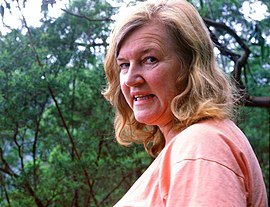
Back فال بلوموود Arabic Val Plumwood Esperanto Val Plumwood Spanish ول پلوموود Persian Val Plumwood Finnish Val Plumwood French വാൽ പ്ലംവുഡ് Malayalam
Val Plumwood | |
|---|---|
 Plumwood in 1990 | |
| Born | Val Morell 11 August 1939 Terrey Hills, Australia |
| Died | 29 February 2008 (aged 68) Braidwood, Australia |
| Other names | Val Routley |
| Education |
|
| Thesis | Women of the Mysterious Forest: Women, Nature, and Philosophy, an Exploration of Self and Gender in Relation to Traditional Dualisms in Western Culture[3] |
| Known for | Ecofeminism |
| Notable work | Feminism and the Mastery of Nature (1993)[4] |
| Movement | Ecological humanities, ecosophy |
| Spouse(s) | John Macrae Richard Sylvan |
Val Plumwood (11 August 1939 – 29 February 2008) was an Australian philosopher and ecofeminist known for her work on anthropocentrism. From the 1970s, she played a central role in the development of radical ecosophy. Working mostly as an independent scholar, she held positions at the University of Tasmania, North Carolina State University, the University of Montana, and the University of Sydney, and at the time of her death was Australian Research Council Fellow at the Australian National University.[5] She is included in Routledge's Fifty Key Thinkers on the Environment (2001).[6]
Plumwood spent her academic life arguing against the "hyperseparation" of humans from the rest of nature and what she called the "standpoint of mastery"; a reason/nature dualism in which the natural world—including women, indigenous people, and non-humans—is subordinated.[7][8]
Between 1972 and 2012, she authored or co-authored four books and over 100 papers on logic, metaphysics, the environment, and ecofeminism.[9] Her Feminism and the Mastery of Nature (1993) is regarded as a classic, and her Environmental Culture: The Ecological Crisis of Reason (2002) was said to have marked her as "one of the most brilliant environmental thinkers of our time".[10] The Fight for the Forests (1973), co-authored with the philosopher Richard Sylvan, Plumwood's second husband, was described in 2014 as the most comprehensive analysis of Australian forestry to date.[11]
Plumwood's posthumously published The Eye of the Crocodile (2012) emerged from her survival of a saltwater crocodile attack in 1985, first described in her essay "Being Prey" (1996).[12] The experience offered her a glimpse of the world "from the outside", a "Heraclitean universe" in which she was food like any other creature. It was a world that was indifferent to her and would continue without her, where "being in your body is—like having a volume out from the library, a volume subject to more or less instant recall by other borrowers—who rewrite the whole story when they get it".[13]
- ^ Hyde, Dominic (2014). Eco-Logical Lives. The Philosophical Lives of Richard Routley/Sylvan and Val Routley/Plumwood. Cambridge: White Horse Press. p. 51. ISBN 978-1874267799.
- ^ Hyde 2014, p. 58.
- ^ a b Hyde 2014, p. 186.
- ^ Mathews, Freya (26 March 2008). "Val Plumwood", The Guardian.
- ^ "Val Plumwood (11 August 1939 – 29 February 2008)", International Society for Environmental Ethics.
- ^ Griffin, Nicholas (2001). "Val Plumwood, 1939-", in Joy Palmer (ed.). Fifty Key Thinkers on the Environment. London: Routledge, pp. 283–288.
- ^ Mulligan, Martin; Hill, Stuart (2001). Ecological Pioneers: A Social History of Australian Ecological Thought and Action. Cambridge: Cambridge University Press. pp. 274–300. ISBN 0-521-81103-1.
- ^ Davion, Victoria (Fall 2009). "Introduction", Ethics and the Environment, 14(2), Special Issue on Ecofeminism in Honor of Val Plumwood. JSTOR 10.2979/ete.2009.14.2.1
- ^ "Val Plumwood", Social and Political Theory Program, Research School of Social Sciences, Australian National University, archived 21 November 2008.
- ^ Hallen, Patsy (Autumn 2002). "Review: Environmental Culture: The Ecological Crisis of Reason by Val Plumwood", Ethics and the Environment, 7(2), pp. 181–184. JSTOR 40339041
- ^ Gelonesi, Joe (20 April 2014). "Two lives, green and logical" (audio). "The Philosophers Zone". ABC, c. 00:03:10; also see Hyde 2014, pp. 19–21.
- ^ Cite error: The named reference
preywas invoked but never defined (see the help page). - ^ Plumwood, Val (2012). Shannon, Lorraine (ed.). The Eye of the Crocodile. Canberra: Australian National University E Press. p. 35. ISBN 9781922144171.